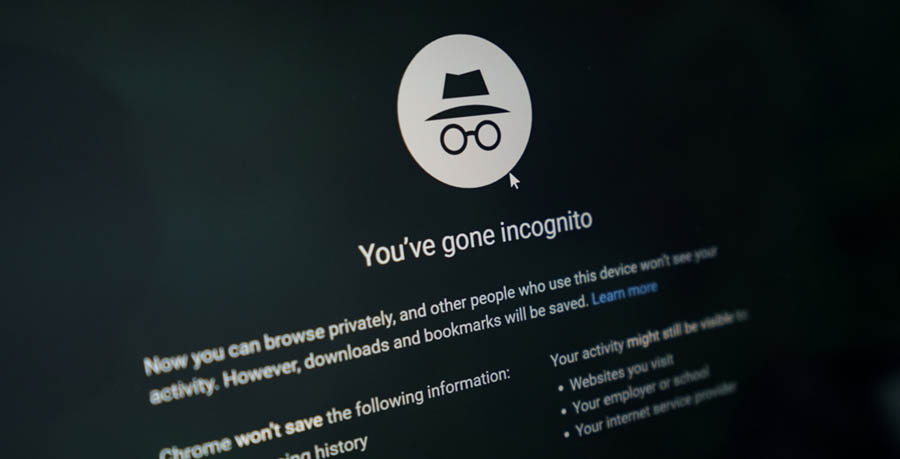What does Incognito Mode Actually Do (and Not do)?
These days most web browsers, either on desktop or mobile, come with an “incognito” or “private” browser mode. But what does this mode actually do and perhaps most importantly, what does it not do? Does it actually keep our browsing private and secure? We explain the features and flaws of this often misunderstood mode of browsing.
Staying secure and private online is often quite the challenge, so simply flicking to the “private” mode of your browser may seem like an easy, appealing way of beefing up your privacy without having to really put much thought into it. However, while private mode does offer some potentially effective privacy benefits, you should also be aware of what it doesn’t do as well.
But let’s start off with what it does.
No cookies, browsing history or download history stored on the browser
When using a normal browser, each time we visit a website, login to a service or download something from the Internet, the browser we use on our device is keeping a record of all of it. There is a good reason for this, of course. It’s so we don’t have to keep logging into or typing in the whole web address of websites we visit frequently, which would be quite tedious if we have to do it on every visit.
A private or incognito mode doesn’t store any of this, though. That means there is no browsing history and no record of data we enter into websites stored on the browser. That means once you close the browser, anyone using your device after you will not know what websites you’ve visited or what data you’ve entered. There is also no browser record of any download history.
Sponsored Content. Continued below…
Perhaps the biggest upside to this is if you visited a certain website – let’s called it ExampleWebsite.com – in incognito mode, once you’ve closed the browser, ExampleWebsite.com doesn’t appear in your browser history, and it won’t pop-up as an auto-complete suggestion when someone types in E..X..A… you get the picture.
Imagine browsing normally, but each time you close your browser, you go into the browser settings and delete your browsing history, form data and cookies. That’s essentially what incognito mode does (but automatically).
Online searches don’t get associated with your account
Chances are high that when you visit Google on your device, you’re already logged into Google. And the chances are the same applies to Bing, which uses your Microsoft/Outlook account. Consequently, if you perform a search, that search becomes associated with your respective account.
However, in incognito mode, you’re not logged into any of these accounts. So unless you login before the search, any online search you do isn’t associated with your respective account. (Of course you can achieve the same effect in normal browsing simply by logging out first.)
Now let’s talk limitations with incognito mode.
Your browsing history is still visible to third parties
While as we pointed out above your browser history isn’t visible on your device‘s browser, this doesn’t mean third parties still can’t see what websites you visit. So for example, incognito mode doesn’t protect your browsing habits from being seen by whoever operates the network you’re on (e.g. school/work) or from your Internet Service Provider, and the website you’re visiting will still have access to the same information about you even if you’re using incognito mode. (And those websites will still know it’s you if you choose to login.) If you want to mask your browsing habits from third parties such as your ISP, consider a VPN. More on that below.
Sponsored Content. Continued below…
Your downloads are still visible
If you download something in incognito mode, while there is no download history, the files you download themselves are still visible in your downloads folder to anyone who uses your device.
No added protection from scams
It would be nice to think that a private mode will also help from a Cybersecurity perspective, but alas this is not true. When it comes to malware, phishing and all the other common online threats, there isn’t any added protection by using your browser’s incognito mode.
The bottom line is that the features and benefits of incognito mode are designed to keep your browsing history and habits off the device, but does little to wipe or obscure them from the Internet itself, and does nothing to help protect you from online threats.
If preventing third parties (ISP, WiFi operators, websites, eavesdroppers) from accessing your browsing history is important to you, we recommend using a VPN (see our editor’s choice here) and when it comes to protecting yourself from online threats, you can’t beat a good security suite and our recommendations are here.
Continued below...
Thanks for reading, we hope this article helped, but before you leave us for greener pastures, please help us out.
We're hoping to be totally ad-free by 2025 - after all, no one likes online adverts, and all they do is get in the way and slow everything down. But of course we still have fees and costs to pay, so please, please consider becoming a Facebook supporter! It costs only 0.99p (~$1.30) a month (you can stop at any time) and ensures we can still keep posting Cybersecurity themed content to help keep our communities safe and scam-free. You can subscribe here
Remember, we're active on social media - so follow us on Facebook, Bluesky, Instagram and X
